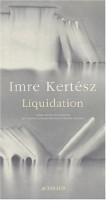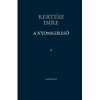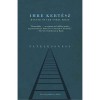categories
- Traffic and Vehicles Catalogue
- socreal.catalog
- Advertisement Catalogue
- Photo Catalogue
- Chinese and Japanese Catalogue
- New Holy Card Catalogue II.
- 12 interesting old books
 Books
Books
 Bibliophil
Bibliophil
 Antiques
Antiques
 Engraving
Engraving
 Maps
Maps
 Photos
Photos
 Antique Papers, Small Prints
Antique Papers, Small Prints
 Posters
Posters
- Circus
- Modern Graphics
- Socialist Realism
- NER Propaganda
- Others
cart
Cart is empty
You've not logged in
Kertész Imre : Liquidation
- description
- additional information
roman traduit du hongrois par Natalia Zaremba-Huzsvai et Charles Zaremba
Imre Kertész is an Auschwitz survivor. It seems, without alluding to this fact, the book is about being a survivor. Liquidation, his first novel since winning the Nobel prize in 2002, is basically a fictionalised argument that after Auschwitz, fiction is an unworthy pursuit. Having said all that, Liquidation is a philosophical and cerebral novel. Perhaps not an ideal read for my current state of mind which is constantly thinking about the next project and impatient to get on to the next task. But I love Budapest and especially interested to read a book which is written by a Hungarian author and a Nobel Prize Laureate. Ten years have passed since the fall of Communism. B, a writer of great repute – whose birth and survival in Auschwitz defied all probability – has taken his own life. His friend Kingbitter discovers among his papers a play entitled Liquidation, in which he reads an eerie foretelling of the personal and political crises that he and B’s other friends now face. Kingbitter’s find precipitates a frantic search for the novel that Bee may or may not have left behind. That B was having an affair with Sarah, behind his wife Judit’s back and we soon found out Judit is having an affair behind B’s back with now husband Adam. While Kingbitter himself was having an affair with B’s ex-wife Judit. The love affairs seems to give this novel a facetious air but there is nothing facetious about Liquidation; it aims to induce in us the same state of despair that obviously afflicted Kertész when he wrote it, but through the characters, depicts how surviving a tragedy such as the Holocaust could scar a person for life. This is particularly brilliantly described by Judit’s life with B. As B spent his time reading and writing, and writing and reading away, B is incapable of love and incapable of building close relationship with other human being and it’s not a pleasant thing to be his wife either.
Prix Nobel de Littérature 2002
Imre Kertész is an Auschwitz survivor. It seems, without alluding to this fact, the book is about being a survivor. Liquidation, his first novel since winning the Nobel prize in 2002, is basically a fictionalised argument that after Auschwitz, fiction is an unworthy pursuit. Having said all that, Liquidation is a philosophical and cerebral novel. Perhaps not an ideal read for my current state of mind which is constantly thinking about the next project and impatient to get on to the next task. But I love Budapest and especially interested to read a book which is written by a Hungarian author and a Nobel Prize Laureate. Ten years have passed since the fall of Communism. B, a writer of great repute – whose birth and survival in Auschwitz defied all probability – has taken his own life. His friend Kingbitter discovers among his papers a play entitled Liquidation, in which he reads an eerie foretelling of the personal and political crises that he and B’s other friends now face. Kingbitter’s find precipitates a frantic search for the novel that Bee may or may not have left behind. That B was having an affair with Sarah, behind his wife Judit’s back and we soon found out Judit is having an affair behind B’s back with now husband Adam. While Kingbitter himself was having an affair with B’s ex-wife Judit. The love affairs seems to give this novel a facetious air but there is nothing facetious about Liquidation; it aims to induce in us the same state of despair that obviously afflicted Kertész when he wrote it, but through the characters, depicts how surviving a tragedy such as the Holocaust could scar a person for life. This is particularly brilliantly described by Judit’s life with B. As B spent his time reading and writing, and writing and reading away, B is incapable of love and incapable of building close relationship with other human being and it’s not a pleasant thing to be his wife either.
Prix Nobel de Littérature 2002
| condition: |      |
| category: | Books > Foreign Language Books > Books in French > |
| publisher: | Actes Sud, 2004 |
| item number / ISBN: | 9782742747634 |
| binding: | paperback |
| pages: | 126 |
| language: | French |











![Kertész Imre : A nyomkereső / Detektívtörténet - Két regény. [Első kiadás] Kertész Imre : A nyomkereső / Detektívtörténet - Két regény. [Első kiadás]](/images/item_image/100/2121.jpg)

![Kertész Imre : Sorstalanság - A kudarc - Kaddis a meg nem született gyermekért [Díszkiadás] Kertész Imre : Sorstalanság - A kudarc - Kaddis a meg nem született gyermekért [Díszkiadás]](/images/item_image/100/9713.jpg)



























![Kertész Imre : Kaddis a meg nem született gyermekért [Első kiadás] Kertész Imre : Kaddis a meg nem született gyermekért [Első kiadás]](/images/item_image/100/55092.jpg)

















 Telefon:
Telefon: E-mail:
E-mail:







